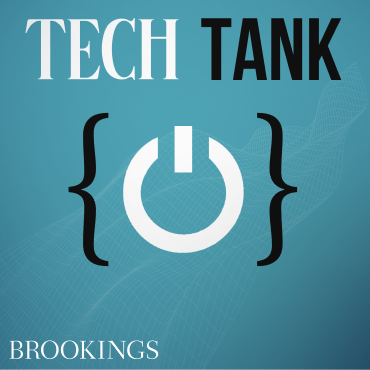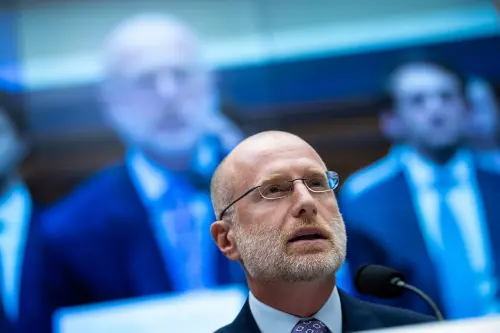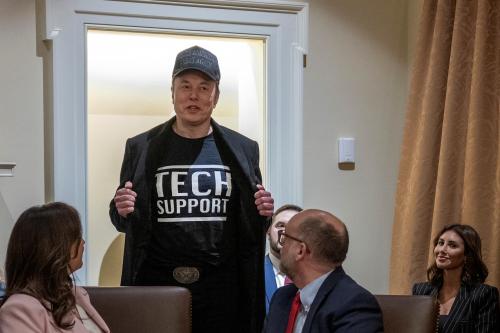TechTank, a biweekly podcast from the Center for Technology Innovation at Brookings, explores today’s most consequential technology issues. Moderators Nicol Turner Lee and Darrell West speak with experts and policymakers to share data, ideas, and policy solutions that address the challenges of our digital world.
In the 21st century, a handful of U.S. tech companies wield enormous influence over how we receive and share information. In response, the EU has advanced landmark regulatory frameworks like the Digital Markets Act and the Digital Services Act, but these efforts have recently faced backlash from the Trump administration.
As Europe faces this mounting U.S. pressure and growing waves of AI-enabled information operations, lawmakers continue to grapple with not just how to regulate these platforms, but also how Europe can chart its own course between American Big Tech influence and democratic protections.
In this episode of the TechTank Podcast, guest host Courtney Radsch is joined by Marietje Schaake, a nonresident fellow at the Stanford University Cyber Policy Center and an international policy fellow at the Stanford Institute for Human Centered Artificial Intelligence, to discuss these challenges and the digital sovereignty debate.
Listen to the episode and subscribe to the TechTank Podcast on Apple, Spotify, or Acast.
Transcript
[00:00:00] CO-HOST NICOL TURNER LEE: You’re listening to TechTank, a biweekly podcast from the Brookings Institution exploring the most consequential technology issues of our time, from racial bias and algorithms to the future of work TechTank takes big ideas and makes them accessible.
[00:00:31] GUEST HOST COURTNEY RADSCH: Welcome to the TechTank Podcast. I am guest host Courtney Radsch, a non-resident fellow at the Brookings Institution and the director of the Center for Journalism and Liberty at Open Markets Institute. In the 21st century, a handful of US tech companies have enormous influence over how we receive and impart information, how we share opinions, who can speak, and who we listen to.
As these tech companies further consolidate their control over our critical communication channels through massive user data collection, amplified personalization algorithms, and opaque artificial intelligence products. Control over our information and communications infrastructure is at risk as never before. In particular, Europeans are facing growing threats to their fundamental freedoms and democratic processes. As threats from the Trump administration and tech companies against regulation have increased in recent months. These threats are also growing in the face of increasing adoption of artificial intelligence, tightening their grasp on information news and debate, but also equating innovation and competition with American hegemony and dominance.
In response, we’ve seen Europe create regulatory frameworks that attempt to give back control to its citizens. We’ve seen regulatory milestones such as the Digital Markets Act and the Digital Services Act that have been intended to reassert control and become central pillars of the growing digital sovereignty debate. But as we’ve heard recently, these laws are facing backlash from the Trump administration. So, as Europe faces this mounting US pressure and growing waves of online AI enabled information operations, questions abound, not just about how to regulate platforms and AI, but also, how Europe can chart its own course between American big tech influence and democratic protections. Which is why I’m so delighted to be joined today by Marietje Schaake to discuss these important questions.
Marietje is a non-resident fellow at the Stanford University Cyber Policy Center and an international policy fellow at the Stanford Institute for Human-Centered Artificial Intelligence. She’s also a former MEP in the European Parliament, and I think, we’ve known each other for more than a decade since we first met, uh, in Brussels, when I believe I brought some human rights activists and journalists to talk to you as one of the only members of Parliament who was really focused on technology and trade issues.
Now, you’ve recently authored a book, The Tech Coup: How to Save Democracy from Silicon Valley. So, with that, let’s jump in. Marietje thank you so much for joining me.
[00:03:19] GUEST MARIETJE SCHAAKE: Thanks for having me. It’s a pleasure.
[00:03:24] GUEST HOST COURTNEY RADSCH: So, in The Tech Coup, you describe a global power ship. Not through tanks or elections, but through code, platforms, and algorithms, and argue that democracies didn’t just fall behind in the digital age, they were outmaneuvered. So before we get into the free speech and sovereignty, can you briefly explain how did this happened and what makes it a coup instead of say just a disruption?
[00:03:50] GUEST MARIETJE SCHAAKE: Right. So I wanted to show that the, uh, growing power, power grab, but also outsourcing to tech companies with, you know, profit incentives is a threat to democracy and that it’s a systemic problem.
So for a lot of people when they hear technology and democracy, they may think about disinformation, which is very important. Where they may think of, you know, social media and a foreign manipulation of the public debates and so on. Those are, again, very important. But I, I see a much more systemic, wider problem that also includes infrastructure, that also includes, uh, cybersecurity, scanning for risk, really a sort of, you know, systemic way in which think about aspects of our lives, of our societies and, and try to imagine an area where tech companies are not, powerful.
You know, digitization often means privatization. And so what I wanna show in the book, and this was before Trump got elected for the second time, is how tech companies, the CEOs, are increasingly in positions of decision-making power, um, issues that are very consequential, whether it’s on, you know, discrimination or whether it is on national security, or whether it is on, uh, who gets to participate economically.
These are the, the governors of our time, and I think what’s lacking is countervailing powers independent checks and balances, you know, transparency and accountability, and that’s why it’s such a problem.
[00:05:20] GUEST HOST COURTNEY RADSCH: I mean, I agree with you. Um, you also write that the Digital Revolution has seen private companies increasingly take on functions, normally assumed by states leading to a concerning erosion of agency and accountability. And as you said, you wrote this before the Trump administration before we saw, the leaders of Silicon Valley sitting at the front of the inauguration, before we saw the integration of, uh, Silicon Valley AI products into the government and, and DOGE, it, it feels to me like we’ve really seen an increase in this problem.
But what do you see? Is there an, is anything different now or are we kind of just on the same path that we started?
[00:06:03] GUEST MARIETJE SCHAAKE: Well I think it’s all accelerating and in, in many ways the role that, um, President Trump is giving to tech CEOs is sort of the logical next step. If you look at the buildup of their growing power, you know, the aspiration to not only disrupt markets, but also disrupt governments, disrupt states, disrupt democracy, and I just see a power hunger. Uh, among these tech companies that of course wouldn’t stop at borders, wouldn’t stop at laws. That’s sort of been the mantra from the beginning. But what is new now, and it’s unfortunately very problematic for those of us who have aspirations of seeing democratic regulations around AI and other technologies, is that the US is no longer participating. So where the rest of the world is concerned with, you know, safety risks of AI, wants to govern AI. The US is not participating anymore. You know, the Trump administration has a deregulatory agenda, has a very anti-European agenda in which tech regulation is one of the key focal points. And um, when I, when I wrote The Tech Coup I was still hopeful that there would be forces in the US that we could count on, that there was a shared interest in seeing some aspects of our lives, of the public interest of our national security, uh, not disrupted.
And, you know, it’s been dramatic to see the extent to which the Trump administration has changed the potential of the US of being, you know, a part of that sort of global democratic coalition to also govern technologies.
And so that’s, you know, a dramatic shift and one that we have to reckon with in many ways. Especially in Europe, but uh, certainly also when it comes to tech and the need to have those countervailing powers in place.
[00:07:49] GUEST HOST COURTNEY RADSCH: And so it feels to me like that might be something that is fundamentally different because of course the Obama administration also did a lot to bring tech into government, you know, created new roles for tech, new links with Silicon Valley. We’ve seen several countries open embassies in Silicon Valley and have, you know, ambassadors to Silicon Valley, which is, I think, a reflection of that power. And you know, even under the Obama administration as well they exported a lot of these protectionist trade policies that protected big tech platforms that, you know, forced other countries to adopt Section 230 style protections against intermediary liability, et cetera.
So, um. It. The difference, it sounds like today, you’re saying is that it’s accelerating, but it’s also kind of more of the same. Help us understand how different is this, because it seems like American tech companies have been dominating the economy and the information system in Europe for at least the past, what, 15 years?
[00:08:59] GUEST MARIETJE SCHAAKE: Oh I absolutely agree, and I think we’ve all been naive about, you know, the, the harms and the, the excesses that we would see, um, you know, emerging as these companies just grew and grew and grew. So you’re right that Obama really leaned on social media companies, you know, uh, data analytics for his election, and it was very much combined with a promise of more democracy. That this was a way to empower people to, um, uh, give a voice to the unheard and, the companies at the time, even if they were powerful, were of course less powerful than they are today. Since, since President Obama was in office, maybe thanks to him being in office, we’ve seen companies like Google growing, uh, seriously, but also, you know, Facebook slash Meta, uh, Microsoft, all these big tech companies are now so much bigger and have so many more functions than they had at the time.
That their role in society is much more of a sort of foundational character than of a sectoral character or of even a product. You know, you can’t even think about them as products anymore because they have so much data that they can then use for, uh, new services, training AI models.
But also understanding things about society that are incomparable to what other entities, uh, have access to. And so the potential for abuse from manipulation, for using that information with political agendas is now manifesting itself. And I do think that that’s different. So in my book, I point out to the power that CEOs have.
I mean, I vividly remember all these discussions when especially Americans were challenging the legitimacy of European regulations and they said, oh my gosh, who wants a minister of truth? You know, no censorship, no intervention. This is sort of similar to what we hear Vice President Vance saying now that Europe is censoring.
But of course, at the time already. We, we knew that Mark Zuckerberg was essentially the minister of truth, that there is no neutrality in these technologies. There never was, not politically, not economically, but what is new now is that the alliances are so much more explicit.
So where the companies might have still pretended that they did not make choices, they wanted, you know, policy to stay away. That’s why they took this hands-off approach because I think they, they were afraid to step into the political minefields of where the limits of free speech were and so on. Right now, they’re explicitly aligning themselves with this administration, supporting the president, calling for his help when there are antitrust fines coming from Europe, when there are regulations coming from Europe and they are, you know, explicitly saying we are in the world to strengthen the United States of America.
If you listen to someone like Alex Karp, the CEO of Palantir, highly controversial company, you know, he’s been preaching the dominance of the West, but of course the west has been destroyed by this president and it has had no consequences for what Palantir does.
If you look at Mark Zuckerberg, you know, he has really come around to be much more conservative, much more aligned with Trump. Uh, someone like Sam Altman as well was asking for AI regulations is now so happy that Trump administration is, is having a deregulatory agenda.
So it’s more explicit how politicized things are, where these companies stand, and how blatant they are in supporting the US even deploying people in the US armed services.
[00:12:26] GUEST HOST COURTNEY RADSCH: Right. I mean, it, it really is amazing just how politicized, because of course we’ve seen informal efforts by governments to influence the content moderation policies of platforms, you know, to get them to implement their terms of service through, you know, internet referral units or during public health crises like COVID. But this seems to be particularly different, right? We saw, for example, that X algorithms systematically amplified extremist and far right content during the German elections where far right parties were boosted disproportionately, um, after the mass stabbing in the UK. Where we’ve seen Elon Musk personally intervene to amplify voices that he favors, that aligns with President Trump, including manipulating not just X, but also his chatbot, grok, which by the way, is now authorized for use in the US government, to push white genocide myths, pro-Nazi talking points, et cetera. And you know, we’ve seen Facebook permitting state propaganda and promoting, again, a, a lot of extremist content. Um, we saw Google and Apple app stores, give into pressure from the administration to remove what are called ICE tracking apps, essentially to be able to track, you know, where the ICE agents are going.
So we’ve really seen, I think, you know, I have to agree with you that it, it’s kind of an escalation and, you know, more of, of some of these interventionists and, and explicitly politicized intervention. And you know, I think back to our first meeting. I think it was 2011 when, as you said, these platforms were fundamentally different.
Human rights activists, democracy activists were able to use them to help bypass state censorship of mainstream media to reach the global media. And back then we used to talk about digital sovereignty as a problematic concept being used by authoritarian states or states that wanna control their information environment, I would say from a negative perspective.
But now it seems that we’re talking about digital sovereignty and there’s a lot more agreement and a lot more usage of that term and concept by democracies, by their European Union. What do you think about this idea of digital sovereignty and, and are we talking about something different than we did before?
Is it just as you said, everything is so different now.
[00:15:05] GUEST MARIETJE SCHAAKE: Well, I think both. So on the one hand. Having state control in a authoritarian state has different consequences than having, you know, jurisdictional control in a democracy. So even if you could argue that they’re both sovereignty, meaning that the companies have to comply to the laws of the land.
The consequences for people, I mean, human rights defenders first and foremost, but think about journalists or, uh, others who are, who are critical of the powers that be, of course, what you, uh, may face as a result of expressing critical, critical viewpoints towards the, the sitting government in an authoritarian state is fundamentally different than what you might face in, in any EU member state because there is also charter fundamental rights and so on. So, um, consequences are different but I think this was a reckoning that was long overdue. You know, the idea that the global internet would just sort of ignore political conflicts, nations borders, uh, the laws of the land was just, you know, I think a vision that for a long time had support from the democracies in the world because they thought it could be a vehicle towards democratization, that indeed, the empowerment of human rights defenders, critics, opposition leaders in authoritarian states through these tech platforms would be a net plus from a democracy point of view.
But right now, uh, speaking from a European perspective, it feels like a huge risk that we are so dependent on US technologies that, you know, through decisions by the executive, adoption of sanctions or the independent choices of the CEOs, Elon Musk, um, taking a stance for the far right in the German elections and, and, and other elections is becoming a huge risk. So the US has changed and therefore the view of US technologies have, has changed the alliances, you know, at a greater tension than it’s ever been. Um, this has consequences for defense, but also for digital. And I think actually. European responses are not even going far enough. So we hear talk about digital sovereignty, but it’s hard to actually identify what is done differently on a day-to-day basis than what we saw maybe two years, five years, 10 years ago.
And so I think we actually need much more dramatic investments, the use of procurement as a leverage. So, looking at the criteria that would allow the rescinding of existing contracts, looking at new criteria for new contracts because you know, if you boil it down, Europeans, including European taxpayers through their governments are subsidizing the success of Silicon Valley, are feeding the monster that’s attacking them at the same time.
And that, you know, it doesn’t add up. It doesn’t make sense. And so it’s really urgent that this sovereignty, uh, gets more, you know, meat on the bones, so more substance to it, rather than being a slogan, a motto, a strategic perspective, which it’s great that there is alignment, you know, I think everybody agrees we need a Euro stack.
We need more, um, strategic autonomy, but now let’s, let’s make it work, make it actionable.
[00:18:20] GUEST HOST COURTNEY RADSCH: Yes. I mean, that makes me think about, for example, the UK procuring cloud services from, uh, was it Microsoft or Amazon? Right? So part of the challenge, isn’t it, that these big tech platforms are so dominant, right? They have such a corner on the market, and I think that as the, you know, AI revolution is underway, there’s this idea that if you somehow regulate, AI, you’re going to impede innovation and competition.
And yet it seems to me like we’re not really talking about, what are we innovating towards? What are we competing for? Because if China is our base model, is that going to lead us to the type of societies, we want? But can Europe really realistically have an alternative given the market dominance throughout the tech stack, throughout the AI stack? You know, again, the infrastructural cloud, underwater sea cables, satellites, social media, search app stores, devices. I mean, where should Europe focus its efforts on digital sovereignty?
[00:19:32] GUEST MARIETJE SCHAAKE: Right. Well, you mentioned the UK and I, I do have to just mention for the record that this UK government, despite being of progressive signature, is just a cheerleader for Big Tech.
It’s remarkable, and it’s been, you know, very revealing to see the, the amount of sucking up to Big Tech, um, on the, on the EU front, look, I hear a lot of people concerned that this is going to be an uphill battle, and I agree it will be hard, but I will, I will only evaluate something when it’s been attempted and we haven’t tried.
So I think we should give it our best. See the urgency, not just from an economic perspective. And I think that this is really important, but also from a, self-determination of individuals, sovereignty of states, national security. What does it mean if you don’t have control over the entire stack of your communications channels?
I mean, I was talking to people in civil society recently and just asking out loud, like, okay, if you wanna have some kind of campaign, be it against the genocide in Gaza, be it against Trump, be it, you know, for gay rights, what have you, and you would have to imagine mobilizing and reaching people without using social media, where would you go?
Like we really have to sort of, you know, unlearn or reshuffle, uh, where we go. And I think, you know, looking at Ukraine actually gives me inspiration. Who would’ve thought that they would be the key innovative producers of drones? Let’s say five years ago, and we all know that it’s for very sad reasons, you know, we really would’ve wished that that Russia had not invaded the country and that they would not have been forced to innovate in defense and warfare to simply defend their territory.
But this is where we are. And so, it shows that things that seem difficult with a great sense of urgency can be solved.
And unlike Ukraine, the EU is much more wealthy. Has enormous foundations to build on, of industry, of investments, and also of European innovations and tech products. They have just never been prioritized, not by governments, not by by citizens, but if I listen around me, everybody. Everybody is talking about the need to be less dependent because people are concerned. They see what can happen. They also see a US president who would’ve ever thought that would be possible, personally intervene in the businesses that are American, taking a stake, forcing a sale to a friend. You know, I’ve, I’ve often wondered what would responses of Republicans be if Democrats would’ve pulled this off.
I mean, we would’ve, we would’ve heard accusations of communism all around, I’m sure, but this is now a Republican president personally intervening, taking stakes in companies. That just upsets the whole notion of what the private sector is, what the relationship with the government is, uh, and also the, the assessment of what, the impact of our dependence on US technologies is in fact dependence on US Tech was never really a topic. Now it’s a huge issue.
[00:22:39] GUEST HOST COURTNEY RADSCH: Mm-hmm. Yes, I, I agree. And I, I want to really hone in on the free speech aspect of this, right? Because, I think we have seen an escalation of attacks on free speech in the United States on media.
Um, the use of regulatory coercion and, and strong arming to get money from big media, as you’ve said, the business deals that the administration has done with tech companies, including subsidies, but as well as direct deals with the president. What are you worried about in terms of freedom of speech? As you see, you know, these deals taking place as you see this effort to control speech history, the cutting off access to research, redoing Smithsonian’s history, all of this in the US, and yet there’s this rhetoric by the US that Europe, Europe is not as free speech protective, that somehow, you know, laws against hate speech or the Digital Service Act, is akin to censorship.
What’s your response to that?
[00:23:53] GUEST MARIETJE SCHAAKE: Well, initially, let me just be clear, I think all the statements by this president and his supporters, whether it’s the vice president or the CEOs of the tech companies that are claiming to be pro-free speech, while they’re picking up students who are writing a critical op-ed or they are, uh, pushing cable networks to push standup comedians, or what you call it, talk show hosts off the air.
Everybody sees that, that the rhetoric around free speech of this administration and its supporters is a lie. And so I guess they need a scarecrow to pretend this is still true and that scarecrow apparently is Europe. And look, they have the freedom to say that, that’s fine. We actually have freedom of speech.
We have laws that are somewhat different from the United States, but I think, uh, there’s no, there is no ground in all these accusations of censorship. Actually, the Digital Services Act doesn’t say, what can and cannot be said, it just puts obligations on the platforms to make sure that illegal speech that’s already illegal according to the law does not get spread. And that in a, in an extreme situations like, like take the pandemic as an example, you know, if it is concluded that disinformation has an impact, a substantial impact on public health, or if there’s a systemic threat to democracy, for example, by foreign interference in elections, that platforms have to act.
Uh, so I think what’s good about the EU situation is that it’s explicit, it’s legal, the past two, challenge, uh, these laws are clear. In the US, a lot of curation of information is happening. A lot of intervention in speech is happening, but it’s all political. It’s not according to the law, it’s implicit.
It’s through pressure and intimidation. This whole notion that the US is somehow the torch bearer free speech doesn’t hold up in Trump’s America.
[00:25:52] GUEST HOST COURTNEY RADSCH: And when we look to Europe and the Digital Services Act, I think, what I see happening is, um, not necessarily a robust defense, right? There’s a debate over whether Europe is going to enforce the DSA, the Digital Markets Act, the EU AI Act, and as you pointed out, these are democratically enacted laws. How do you think that Europe should be responding? You said, um, they’re not doing enough in terms of actually putting their money where their mouth is and their procurement dollars, but, what about with respect to how it’s standing up for rule of law in Europe?
[00:26:35] GUEST MARIETJE SCHAAKE: Well, it, it’s a big question hanging over Brussels and something that concerns people a lot.
How rigorous is the enforcement of these laws going to end up being when the pressure grows? And we’ve seen concerning steps, you know, where, Commission President Ursula von der Leyen has essentially censored, haha there is censorship in Europe, has censored, uh, a member of the European Commission and basically urged her not to talk about a competition case against Google, even though competition is in her portfolio.
So, what I gather is that this is obviously of, uh, significant strategic consideration that Commission President von der Leyen has made the chef. Something that she wants to decide about. But I think the ultimate decisions about the strictness of enforcement and, you know, what might or might not be negotiated with US has, has not been made and that they’re keeping some cards to their chest.
But I think the fact that this is now an open question is bad. You need to have absolute clarity that laws that are adopted will be enforced. Otherwise the, the sort of credibility and the legitimacy of the laws that indeed have come about through the normal democratic process begins to corrode. And I think that that would be a threat to sovereignty as well. So we think about tech sovereignty in terms of, you know, building infrastructure, building a tech stack. That’s one aspect. But the other aspect of tech sovereignty is also to stay firm on the tech regulation that is on the books. And that simply needs to be enforced no matter who is pushing back against it.
[00:28:13] GUEST HOST COURTNEY RADSCH: I think that is a very insightful point that I hope you know the, the Europeans here because it does feel like there is this split in what used to be the democracies of the world that would stand up for these fundamental human rights. And despite the market dominance, you know, there had been some movements in recent years to leverage competition authority, to, use the powers of antitrust intervention and pro-competition policy.
But then, we’ve seen what I think many, including, you know, myself, would see as a lackluster set of remedies for Google’s illegal monopoly on search. We don’t know what’s gonna happen with Ad Tech yet, but we also saw Europe impose some pretty massive fines on Google.
So it seems like, you know, the, the jury is still out on the competition front. Do you think that we need to be looking to, antitrust and competition authorities more so than kind of the the political side of things at this point, to break up the power of these corporations.
[00:29:20] GUEST MARIETJE SCHAAKE: Well, the competition authorities are independent. Uh, what I would look to most is the enforcement of the Digital Services Act because it’s very clear that the Trump administration takes most issue with that. And it’s interesting, right? Because there’s also an AI act that we don’t hear as much criticism about. There’s really a fierce, opposition to the Digital Services Act, and it’s probably because the platforms, the social media companies, are the vehicle to influence populations to, uh, spread information or to have an impact on elections, the public debate, what have you, as we’ve seen with the infamous German, uh, example and, and X. So, I think it’s very striking. It may change with regards to the AI Act, of course we’ve heard strong words from the White House, but we’ve also seen American companies supporting the code of practice, you know, committing to it because they understand that their consumers are in Europe, and if you wanna do business in Europe, you have to abide by the law.
Whether you’re selling toys or selling AI, that’s normal. So we’ll have to see. Um, but I hope that. The European Commission is increasingly appreciating the urgency here, that there’s no room for nostalgia. The transatlantic relation as we’ve known it is done. And I think, a number of political leaders are still trying, you know, look at what the UK is doing to keep hammering on this, this special relationship on history, not really accepting the bitter reality.
I don’t wanna, you know, gloss over that. It’s very, very hard. It’s a dark moment, in geopolitics, in the transatlantic relation. But I think the only way that populations can be prepared to do what it takes is also if their leaders accept the reality that Trump has created. This is not something Europe wanted, but it’s a reality we’re confronted with and now have to step up to, to draw the consequences and make radical choices the way that we’ve shored up investments in defense.
The same kind of action boldness is needed for digital sovereignty.
[00:31:25] GUEST HOST COURTNEY RADSCH: Well, action and boldness is indeed needed for digital sovereignty and for true protection of free speech. I wanna thank you, Marietje, so much for coming on talking about this. I wanna thank you for your book, The Tech Coup: How to Save Democracy from Silicon Valley, and, despite the dark times for shining a light on these topics and standing up for human rights, democracy, and the sovereignty of other democracies.
So with that, thank you so much for joining us. Thanks for being on TechTank. And until next time.
[00:32:01] GUEST MARIETJE SCHAAKE: Thank you.
[00:32:08] CO-HOST NICOL TURNER LEE: Thank you for listening to TechTank, a series of round table discussions and interviews with technology experts and policy makers. For more conversations like this, subscribe to the podcast and sign up to receive the TechTank newsletter for more research and analysis from the Center for Technology Innovation at Brookings.
The Brookings Institution is committed to quality, independence, and impact.
We are supported by a diverse array of funders. In line with our values and policies, each Brookings publication represents the sole views of its author(s).











Commentary
PodcastOn European digital sovereignty and platform regulation with Marietje Schaake | The TechTank Podcast
Listen on
October 20, 2025